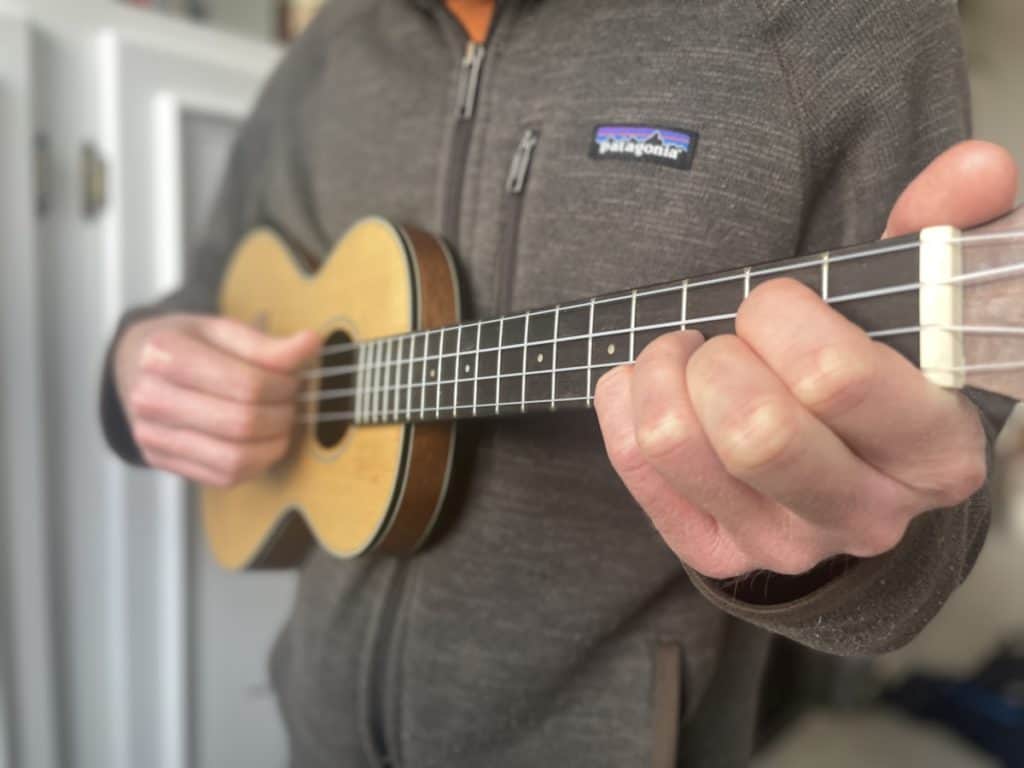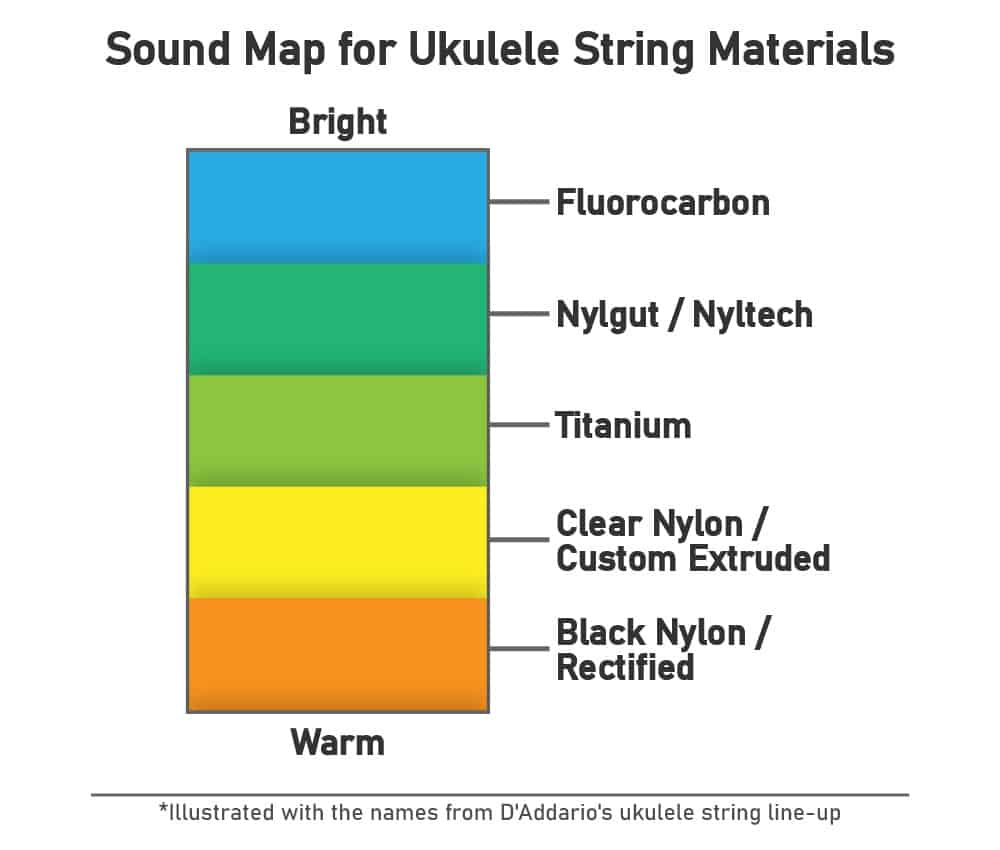Today I’m going to explain how loud ukuleles are.
This is an important consideration for a lot of people who want to play ukulele, especially for those who live with family, roommates, or in apartment buildings.
So let’s jump right into it.
How Loud Ukuleles Sound
Ukuleles might be louder than you think.
Ukuleles produce about 70-85 decibels of sound, which is roughly equivalent to the sound of a vacuum cleaner or diesel truck. This applies to un-amplified ukuleles, and can vary significantly based on the type of ukulele, the type of strings, and how forcefully the instrument is being played.
As one example of this, I tested my own ukulele using a sound measuring app called Decibel Meter, and I found that my ukulele produced an average of about 74 decibels when fingerpicking pretty forcefully, and about 82 decibels when strumming forcefully.

This is just one example, but I think it’s a nice illustration of how the sound output of ukuleles vary within a range.
Now, if you think you have a ukulele that is particularly loud, here are a few things that might be boosting the volume.
Why a Ukulele Might Sound Loud (5 Things that Boost Volume)
1. Type of Ukulele
There are 4 main “types” of ukuleles:
- Soprano
- Concert
- Tenor
- Baritone
Some people might also throw “bass” in there as a 5th type.
If you’re not sure what kind you have, it’s probably a soprano or a concert ukulele, as these are by far the most common.
In addition, there are design variations between different brands and styles of ukuleles. As a result, you should expect there to be variations between the volume of different ukuleles.
And as a very general rule, you can probably expect larger ukuleles (like tenor and baritone ukes) to be louder than smaller ukuleles. Think about it, the larger the instrument, theoretically the more potential it has to project noise.
2. Ukulele Strings
Not all ukulele strings are created equal. There is actually a wide variety of different string materials, and each one has different sound characteristics.
Here’s a chart that gives an overview of the sound profile of various common string materials:

This chart doesn’t exactly describe the different VOLUMES of strings, but it does illustrate that the materials used to make uke strings will impact the sound they produce.
If you want a simpler comparison of the volume impact of string materials, here it is:
Some larger ukuleles can be played with metal strings, which I would expect to be louder than your typical plastic ukulele strings.
3. Strumming vs. Picking
How you play your ukulele also makes a huge difference in the volume output.
As you may have noticed from my earlier example, the difference between picking and strumming for my ukulele test was 82-74 = 8 decibels.
This may seem like a small number, but the way that the decibel system works, is that an increase in 10 is actually equivalent to doubling the volume.
In other words, strumming is almost twice as loud as fingerpicking on a ukulele.
4. Fingers vs. Pick
I play my ukulele with my fingers, both for strumming and for picking.
However, if you play your ukulele with a pick, then you will likely find that this affects the volume as well.
Intuitively, I would think that a pick would increase the volume. BUT, ukulele picks are often made of felt or leather, which may actually have a muting affect that decreases the sound output. I haven’t measured this myself, but I bet you’d be able to answer this question with your own quick test.
5. Amplification
Finally, all of the above information has assumed that we are NOT plugging the ukulele into an amp.
Using a speaker system would obviously increase the volume of your ukulele, and in that case the upper bounds of the volume output would only be limited by the size of the sound system you’re dealing with.
Ukuleles Are Quieter than Guitars
If you’re deciding which instrument you want to learn, and if the sound output is a big consideration for you, then you’ll care about this comparison.
Un-amplified ukuleles are typically a little quieter than un-amplified acoustic guitars. The larger body and metal strings that are found in most standard acoustic guitars are enough to make them a bit louder than ukuleles, which have smaller bodies and plastic strings.
I tested this with my own ukulele and acoustic guitar, and I found that the guitar was about 2-4 decibels louder than the ukulele. Specifically, it scored about 78 decibels when fingerpicking forcefully, and about 84 decibels when strumming forcefully.
This translates to guitar being roughly 20-40% louder than ukulele, when the two instruments are being played in the same way.
Can You Play a Ukulele in an Apartment? (Without Mad Neighbors)
Now, this raises the very practical question of whether you can play a ukulele in an apartment without having angry neighbors come to yell at you.
If you play a ukulele during reasonable day-time hours, like before 9 PM, then it should be fine to play it in an apartment. With that said, the leases for some apartments have very specific restrictions about playing instruments, so you should double check your lease before you start playing.
Assuming there’s no specific restrictions in your lease, then I think a bit of common sense applies here.
Your neighbors are not likely to get upset if you vacuum or run your garbage disposal at 6 PM on a weeknight. However, if you frequently do those things at 2 AM, then your neighbors would probably get very annoyed.
The same logic applies to playing your ukulele. If you’re doing it at a reasonable time that’s not going to disturb or wake people up, then you’ll probably be fine.
It’s also worth mentioning that some apartment buildings have “thinner walls” than others, so how much sound travels can vary significantly. So, if you can hear your neighbors talking even when they’re speaking with normal volume, then they’ll probably be able to hear your ukulele quite clearly.
Keep that in mind, and try to be considerate.
How to Make Your Ukulele Quieter
Now, if you are able to play your ukulele (which I hope you are!), then you may still want to figure something out to make it more quiet.
There are a few very practical steps you can take to reduce the noise from your ukulele:
1. Play “Softly”
The easiest way to reduce your ukulele’s volume, is to simply play it with less force.
In other words, when you strum or pluck the strings, use a bit of restraint and play them as lightly as you reasonably can.
This can actually significantly reduce the volume. And why wouldn’t it.
We basically do the same thing with our voices when we whisper.
2. Try Fingerpicking
If playing softly doesn’t quite reduce the volume enough for you, then try fingerpicking instead of strumming.
Yes, fingerpicking is more challenging, but it’s also cooler (in my opinion) and can definitely drop the sound levels a bit.
As you’ll probably recall from the numbers I recorded above, just by switching from strumming to fingerpicking you can reduce the volume of your ukulele by about 8 decibels, which is almost cutting the volume in half.
3. Use DIY Hacks
Finally, if the first two steps is not enough, then you have one more option to get the lower uke volume that you need.
You can try some DIY modifications on your ukulele to reduce the volume.
For example, you could tape/seal some paper or plastic over the sound hole. This should reduce the amount of sound that is projected from the instrument. However, it probably won’t make a very big difference, and you have to be careful with how you do this because you could damage your uke in the process.
You could also stuff an old t-shirt, or other clothe, inside of the sound hole of your ukulele in order to reduce the amount of sound that is projected. This is similar to what a lot of drummers do with their bass drum. They’ll stuff a big comforter or blankets in there to help dampen the noise a bit.
This t-shirt method has downsides as well. For one, it’ll change the sound of the ukulele and you may not like the new sound. Plus, similar to covering the sound hole, you’ll probably find that this “hack” doesn’t make a huge difference.
Now that I’ve covered those 2 DIY ideas, I think it’s important to mention that I see this kind of approach as a “last resort” and I would probably never do these with my own ukulele, unless I really had to. If the first 2 options of playing softly are fingerpicking are good enough for you, then I’d recommend sticking to those.